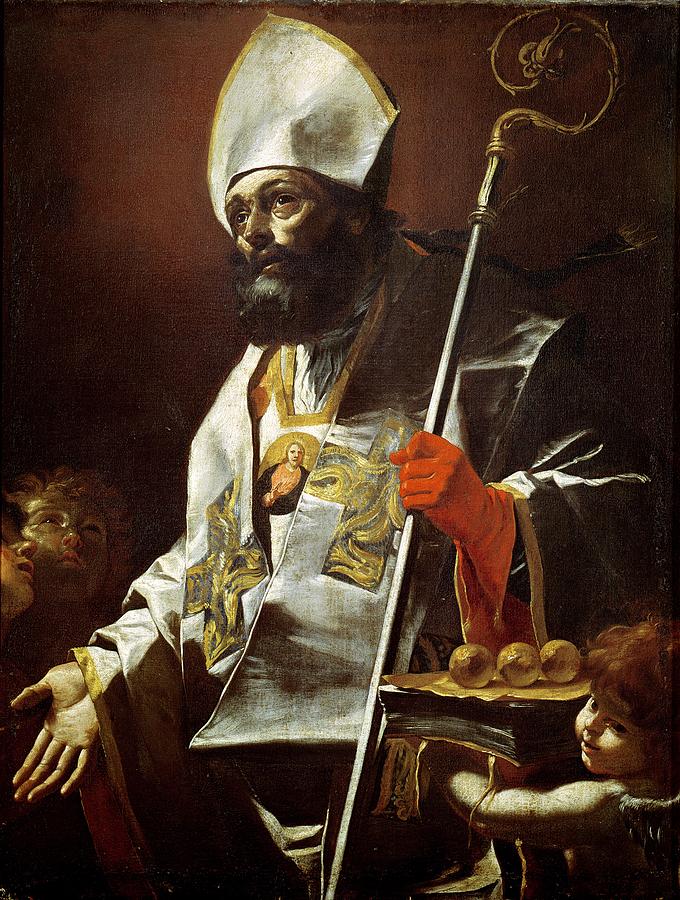MEDITATIONS ON CHRISTIAN DOGMA. TREATISE III. 13. THE SECOND HIERARCHY. St. Nicholas, BpC
St. Nicholas, BpC
MEDITATIONS ON CHRISTIAN DOGMA.
TREATISE III.
13. THE SECOND HIERARCHY.
I. The three choirs of the second hierarchy are, according
to St. Dionysius, associated with the external rule of God
over creatures. The Dominations are the first of these.
They represent the universal sovereignty of the Creator over
all things, they manifest that perfection, assert it, and promote
it. The petition of the Our Father, "Thy kingdom come,"
expresses the object of their existence. The special virtues
of these angels are, therefore, profound adoration towards
the majesty of God, zeal for the maintenance of His authority,
hostility to all those numerous forms of usurpation by which
the devil, or the world, or the flesh, thrust themselves into
the place of God as supreme objects of human homage and
service. You require the spirit of these holy Dominations
in yourself, and their aid in your work for God. A contest
is always in progress between the two standards of Christ
and Satan. A large portion of mankind have adopted, more
or less consciously, the spirit of him who said " I will not
serve," and have cast off the yoke which is sweet and the
burthen which is light. The honourable service of God is
the only true liberty. Those who cast it off only change
masters, and they become the bond-slaves of evil, of misery,
and of Satan. As far as you can, promote the reign of God
in yourself and others.
II. The second choir is that of the Virtues. The meaning
of the word in this connexion is rather that of Scripture than
of common parlance. It does not mean moral excellences
such as patience, faith, etc., but the strength, energy and
overwhelming force of God. So the frequent expression of the
Psalms " Dominus Deus Virtntutn" is rendered "the Lord
God of Hosts." In the New Testament we read, " the power
(virtus) of the Lord was to heal them" (Luke v. 17). The
function of these spirits is to represent that perfection of
God which " reacheth from end to end mightily" (Wisd. viii.
1), and compels all things to H:s will. This is that power
of God which produces miraculous effects in the realms of
matter and of mind. It may well be supposed that God
entrusts to this choir of spirits the execution of His great
works of power, and the duty of aiding others who are so
engaged. The moral virtue that corresponds is Fortitude ;
it is the quality of Apostles and Martyrs, of mighty workers
and sufferers. You need the aid of this blessed choir ; you
are so subject to weakness, discouragement, cowardice. " The
scourge is come upon thee and thou faintest, it hath touched
thee and thou art troubled. Where is thy fear, thy fortitude,
thy patience, and the perfection of thy ways ? " (Job iv. 5, 6).
Only in the power of thy God.
III. The Powers represent that second aspect of the
might of the Lord by which " He ordereth all things sweetly "
(Wisd. viii. 1). This is a force in which there is no feverish
exertion or abusive excess of power. The peculiarity of this
choir is expressed in the Beatitude : " Blessed are the meek,
for they shall possess the land" (Matt. v. 4). It is exhibited
notably in the Church, which is always oppressed and always
victorious ; which does not take the sword of the flesh for
her defence, and therefore cannot perish by the sword ; and
which finds that the blood of her martyrs is the seed of
abounding harvests. In accordance with this, when the
power of the Almighty was manifested to Elias, it was not
in the great strong wind, nor in the earthquake, nor in the
fire, "but in the sound of gentle stillness" (3 Kings xix.
12 Hebr.). To these angels is also attributed a special
power against Satan and his hosts. Do not attach too much
importance to mere natural vigour of character, to a restless
animal activity, to excitement and enthusiasm in good works.
Quiet effort united with prayer is the most efficient and
lasting force.
MEDITATIONS ON CHRISTIAN DOGMA BY THE RIGHT REV. JAMES BELLORD, D.D







Comments
Post a Comment